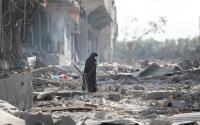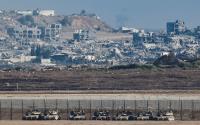The drums of war are getting louder. A total of 35,000 British troops are now heading to the Gulf, where they will join 125,000 US forces already gearing up for action. Together it's enough to start a decent-sized city, let alone crush the rag-tag army of Saddam Hussein. A colossal amount of kit - tanks, ships and planes - is on its way to the desert, too. A Bush-Blair council of war is planned for Camp David at the end of the month. The UN weapons inspectors' deadline will have passed a few days earlier. The orchestra has tuned up; the audience is hushed - all we are waiting for is the clamour to start.
In this atmosphere the chief question for the organisers of the February 15 anti-war demos around the world must be: will we be too late? Over the last few days a change has been in the air, as if the phoney war has ended and the bloody real thing is about to begin.
What should opponents of the war, and doubters, do now? They might be tempted to give up, as if the argument has already been lost. That would be premature. Even if Washington (and perhaps London) has made up its mind - George Bush was drumming his fingers on the desk yesterday, saying "time is running out" - the rest of the world has not. France, from its current perch in the chair at the UN security council, is promising to lead the coalition of the unwilling. "We are mobilised, we believe war can be avoided," said French foreign minister Dominique de Villepin yesterday, launching his bid to become the George Galloway of international diplomacy. Public opinion has hardly been lost either: on the contrary, as the Guardian's own poll laid bare yesterday, outright opposition to war all but commands a majority in Britain.
What's more, the arguments against immediate war remain robust. First, to take on this enemy at this moment is a gross error of priorities. Surely the more pressing threat to our security - confirmed by every new arrest of suspects or discovery of poison in our own country - comes from the terrorists of al-Qaida. Officials in the Bush administration, and in Whitehall for that matter, like to insist that they can walk and chew gum at the same time: that they can take on Saddam without taking their eye off the ongoing battle against Osama bin Laden and his followers. But experience suggests otherwise. One veteran of the Clinton White House admits that, during the Kosovo war of 1999, that conflict was "the only show in town". There are only so many hours in the day and "all the meetings, all the phone calls, all the faxes" were taken up with fighting Slobodan Milosevic: there was no room for anything else. Despite the bogus attempt to pretend the two tasks are intertwined - with Baghdad somehow a front in the war on terror - the likelier truth is that energy that should be spent hunting down the men bent on carnage in London, Paris or Chicago is being diverted instead towards the much less urgent threat from Iraq. To govern is to choose, and our governors are choosing badly.
Of course a war against Iraq is not just a foolish diversion from fighting terror, it is a sure-fire way to fuel it. What more vigorous recruiting sergeants for anti-western militant Islamism could Bin Laden have hired than Bush, Blair and their 160,000 troops - westerners invading and occupying an Arab land?
Second, the anti-war camp is right to allege that at the heart of the current campaign is a severe double standard. Western inaction, even indulgence, of North Korea - where Washington was overcome with eagerness to talk and to avoid force - proves not the risk, but the value of having weapons of mass destruction, or WMDs. Pyongyang has them, so the US leaves it alone; Baghdad does not yet have them, so it's set to get invaded. In other words, if you really do pose a threat, you're safe. If you don't, you're in danger. What better advert for the Bomb could there be! The lesson a second Gulf war will teach the dictators of the world is: buy weapons of mass destruction now. As Kim Jong Il has proved, a nuke a day keeps the Yanks away.
The pro-war camp fares no better, arguing that it's not WMDs themselves that are the problem; it's the risk that these weapons could get into the hands of al-Qaida. This is how the war on Iraq and the war on terror get conflated, but it's bogus. If it were not, several states with closer ties to terror than Iraq would be in the cross-hairs. What about Saudi Arabia, the talent pool from which 15 of the 19 September 11 hijackers were drawn? What about Syria, Iran or Libya with their long records of terrorist patronage? And if the threat is "loose nukes", why not equal pressure on Pakistan, which has lost at least a couple of nuclear scientists to the cause of jihadism?
All these arguments still apply, even as war approaches. But now they need to be cast in a new light. With troops massing, opponents need to present a case that does not look overrun by events. Moderates on the pro-war side can say that, though they might not have sought a confrontation with Iraq in the first place, the arguments now look very different. Military action will free Iraqis from a vile dictator; if victory is swift, and it may well be, there will be great relief and delight among the Iraqi population. Western liberals will then feel pretty sheepish, having argued a matter of weeks earlier that the war to liberate these people was unjust - especially when the true horror of life under Saddam's heel comes to light. Defenders of the UN will also crow that its credibility has been saved; war will have proved that its resolve cannot go unheeded.
So the anti-war camp needs to sharpen up its act now, in advance of these possibilities. First, it needs to insist that disarmament can indeed be achieved - with UN inspections as the device. Sure, it's true that those inspectors were only allowed into Iraq because Saddam was scared by the credible threat of US-led force. Peaceniks ought to admit that their reliance on inspectors is a parasitical position, dependent on the threat of war, but they will just have to swallow their pride. Second, France and others need to exploit the current state of high tension and work on prising Saddam out by peaceful means: now that he believes war is imminent, he may well, like so many dictators before him, blink - and slink off into exile. That would bring the regime change, and freedom for the people of Iraq, that remains the warmongers' strongest card.
Those who want to avert war can no longer simply shake their heads and say they would not have started from here. We are here now and our urgent task is to stop the slide over there - towards mayhem and death.






